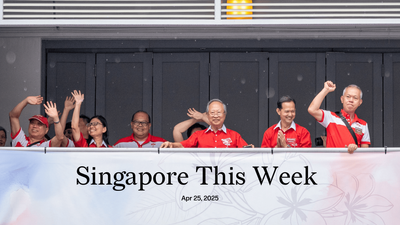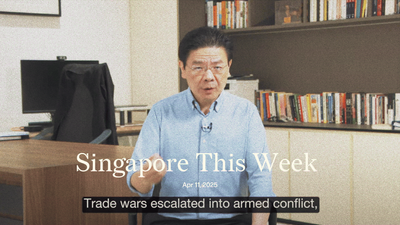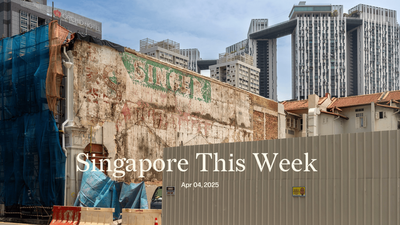Politics: Seahnz
For the first time since independence, there are five empty seats in Parliament. (Six, if one includes S Iswaran, a minister on leave.) The scandals that prompted the resignations continue to reverberate among politicians, members, activists and volunteers at Singapore’s two biggest political parties: the People’s Action Party (PAP) and the Workers’ Party (WP). Morale in both have been hit. Yaacob Ibrahim, a former PAP minister, was the most prominent person to express his bewilderment. He referenced the fact that Lee Hsien Loong, the prime minister, took about three years to fully address the extramarital affair between Tan Chuan-Jin, the former speaker, and Cheng Li Hui, a PAP member of Parliament (MP). “I think there is some concern among some people and I must admit, I’m also a bit perplexed (at how long it took),” Yaacob said, while adding that he’s giving party leaders the benefit of the doubt. Many in both parties also questioned the moral purity demanded of politicians. “It is unfortunate that our politics has developed into one in which personal indiscretions will result in a media circus and people having to leave politics,” said Yee Jenn Jong, WP member and a former non-constituency MP. “If today’s standard and circus had applied in the earlier years, we might even have lost some of our best ministers.” Meanwhile, Lee said that he intends to nominate PAP MP Seah Kian Peng as the new speaker. The former CEO of FairPrice was deputy speaker from 2011 to 2016. His most notable parliamentary contribution was leading the recent amendments to the Maintenance of Parents Act, passed in 1995 to allow seniors to claim maintenance from their children. (The amendments offer extra protections to children.) Outside of Parliament, he is remembered for poking fun at the ethnic Indian name of Kamala Harris, US vice president, around the time of her 2021 visit to Singapore. He joked on Facebook that Kamala spelt backwards is “Alamak” (a Malay/Singlish expression denoting shock). Seah subsequently took down the “not appropriate” post. If he’s hoping to keep his new job, he’d be wise not to pontificate about Lee spelt backwards.
Society: ‘Farewell, Sgt T120387, see you at the end of the shift’
Uvaraja s/o Gopal, a 36-year-old officer with the Singapore Police Force (SPF), died last Friday in an apparent suicide. Raja’s suicide note, posted on Facebook shortly before he was found, said that at work he was subject to racial epithets such as “black and smelly” and “keleng kia” (a Hokkien slur for South Asians, possibly originating from India’s Kalinga region). He felt trapped in a toxic workplace where he allegedly worked 16-hour shifts but got passed over for promotion in favour of lazier colleagues. He also alleged that an attempt to whistleblow, about other officers vaping, was “covered up”. “I went everywhere to ask for help but was shunned and said I was disobedient for reporting the wrongdoings,” he wrote. Some of Raja’s sentiments appear to be corroborated by Naga Raj, the paracounsellor assigned to him. Among other things, Naga said: “In December 2015, Raja’s CO [Commanding Officer] recalled him back to the office while he was on medical leave and questioned the validity of his medical conditions, used vulgarities against him and shouted at him to resign.” (We’ve borrowed Naga’s farewell message for this blurb’s title.) Responding to the tragedy, K Shanmugam, home affairs and law minister, said that Raja’s “serious” allegations will be investigated by SPF. An interim SPF statement said, among other things, that: all of Raja’s complaints over the years “had been investigated and dealt with”; that he faced “substantial challenges at work”; that he was offered coaching and “transfers, at his request, to six different work units in nine years”; and also that he had “tensions with his family”. Though some Singaporeans, including TikTok user @jaarvis6, have questioned the seeming “ownself-check-ownself” nature of this investigation, many police forces have internal affairs units for this very purpose (and from where “Infernal Affairs”, the 2002 Hong Kong classic, gets its name). Yet if this investigation exonerates SPF, there’ll surely be pressure on Shanmugam to do more. Perhaps Singapore could set up a Commission of Inquiry—and have him serve as its chair.
Society: Workers are human, not cargo
Last week, two separate accidents involving lorries ferrying workers resulted in 37 injuries, renewing pressure to end this practice. Over 50 groups have collectively called for the government to ban it. Despite over 20 years of activism on the issue, the government has thus far only mandated improvements to safety and comfort, like higher side railings and canopies. “The feeble steps that the government has taken so far…are grossly inadequate and a mere distraction,” their statement read. “Goods lorries were never designed for human transport…and they violate the dignity of workers…[who are] always anxious if they will reach their destination safely.” They’ve also urged the Ministry of Transport (MOT) to start an initiative to support companies in their transition to safer modes of transport (costs and business constraints are common reasons given for its continuance). Signatories include: community groups and civil society organisations, such as Humans Not Cargo, Migrant Workers Singapore and Workers Make Possible; as well as businesses like Ethos Books and The Projector. This was the second statement this week, and its language was more forceful than the first. (“...if ‘playing nice’ doesn’t work, turn up the heat,” wrote Isaac Neo in a Jom essay on activism.) The first was signed by more than 40 organisations and individuals, such as the Humanitarian Organization for Migration Economics, and Anthea Ong, a former nominated member of Parliament. They want MOT to amend the Road Traffic Act, which presently carves out an exception for workers, allowing them to travel in the rear of lorries (otherwise prohibited). Contrast Singapore with Qatar—hardly a bastion of workers’ rights—where not only do companies ferry migrant workers in buses and vans, but from 2015 were mandated to do so in air-conditioned ones. In early July, Louis Ng, PAP MP and possibly the most vocal political advocate, suggested in Parliament that authorities should map a timeline towards a ban. Said Ng: “We have done so much to make transport safer for our children taking the school bus and soldiers in (Singapore Armed Forces) tonners, but we still continue to transport our workers in unsafe conditions...Why the double standards?”
Society: Pirates of the Strait
There’s been a wave of sea robberies in Asia’s waters, and the Singapore Strait is particularly choppy, according to the Regional Cooperation Agreement on Combating Piracy and Armed Robbery against Ships in Asia’s Information Sharing Centre (ReCAAP ISC). ReCAAP is a multilateral anti-piracy agreement between 16 Asian countries, and its ISC is in Singapore. Its 2023 half-year report noted a total of 59 sea robbery cases from January to June, a 40 percent year-on-year increase, with two thirds affecting ships around Singapore, Johor, Batam and Bintan. Robbers usually target slow-moving, vulnerable ships with a low deck, looking for items such as scrap metal and spare machine parts (which can be resold on the black market). But it’s no cause for serious panic, because most of these robberies have been classified as “least severe”, petty theft—perpetrators are typically unarmed and non-confrontational, escaping when noticed and leaving the crew unharmed in most cases. Contrast this with more severe sea robberies in areas like the Greater Gulf of Aden, where Somali pirates held hostage thousands of seafarers at the peak of the crisis; over 62 died in captivity, while the disruptions cost the global economy an estimated US$18bn (S$23.8bn) a year in the early 2010s. But like Somali pirates, some sea robbers in our region are incentivised to participate in piracy because of poverty and financial pressure. Some are recruited by syndicates. According to Krishnaswamy Natarajan, ReCAAP ISC’s executive director, “the increase in [sea robbery cases] was driven by a socio-economic situation worsened by the Covid-19 pandemic, lower fish catch due to climate change and the prevailing Southwest monsoon”. Amidst global inflation and worsening economic inequalities, locals along the strait are turning to piracy to “make ends meet”. Though the incidents themselves are “not alarming”, there is a worry that ships fearing attack, like fish who swarm when a predator is near, will veer dangerously close to each other. Any collisions could lead to environmental disasters, warns Natarajan, and the possible closure of the Strait. To mitigate this risk, Natarajan wants governments in South-east Asia to step up law enforcement and patrols on the water. Alongside increased surveillance, perhaps existing socio-economic safety nets also need to be strengthened in order to target the root cause.
Society: Gender balance
This week Singapore is scheduled to execute two people, according to the Transformative Justice Collective (TJC): 56-year-old Mohd Aziz bin Hussain and 45-year-old Saridewi Djamani, both for trafficking in heroin. Saridewi will be the first woman killed in almost 20 years. In 2016, Saridewi was caught with 30.72g of heroin. Under the Misuse of Drugs Act, anybody with over 2g is assumed to be trafficking; those with over 15g are liable for the death penalty. In her defence, Saridewi claimed she was stocking up for the fasting month, when she expected her consumption to rise. “The need to stock up almost two years’ worth of supply of [heroin] was unbelievable,” said See Kee Oon, the High Court judge, in his grounds of decision in 2018. She was sentenced to death. The Malaysian man who had delivered drugs to her, Muhammad Haikal Abdullah, was sentenced to life imprisonment and a mandatory minimum of 15 strokes of the cane. He escaped the death penalty because the court found that he met two conditions: his role was just that of a courier, and he gave significant assistance to the Central Narcotics Bureau in its investigation. In her appeal, heard in 2022, Saridewi claimed she was suffering from methamphetamine withdrawal symptoms when she made her statements in 2016. In rejecting her appeal, See assessed statements from numerous doctors and concluded that “Saridewi had at most been suffering from mild to moderate methamphetamine withdrawal during the statement-taking period.” The issue, as often in Singapore, is less about policing or judicial procedure than the existence of an inhumane penalty, one which affects particular groups struggling to survive in one of the world’s most unequal societies. “The authorities are not moved by the fact that most of the people on death row come from marginalised and vulnerable groups,” Kirsten Han, death penalty activist with TJC, told The Guardian. Singaporeans are still overwhelmingly in favour of the death penalty, subscribing to the government’s decades-long belief in its effectiveness as a unique deterrent. But there remains no concrete evidence to support this position, according to the UN. Surely we must do better.
History weekly by Faris Joraimi
The recent rise in sea robberies reminds me of how thin the line has historically been between business and banditry. “Pirates” have always ruled the Singapore Strait and the Riau archipelago nearby. With its treacherous shoals and narrow channels making for quick escapes and plentiful hideouts, these waters were long reputed by foreign sailors to be a pirates’ den. But who is a pirate? That may be easier to define under today’s maritime laws. Things get fuzzier when you turn back the clock 200 years. What the British East India Company considered robbery was thought by the original inhabitants of the Singapore Strait as legal toll collection. The historian Carl Trocki writes that:
The sea peoples possessed the seas and what floated on them by hereditary-feudal right from the Sultan of Johor. So long as their chief held valid title from the Sultan, their ‘patrol’ activities regarding the trade were a legitimate naval operation.
This was different from the conduct of marauders with no royal authorisation, called perompak (robbers). The British, however, didn’t like anything that violated their idea of free and unmolested trade. Hence, even what was once a Malay sea lord’s traditional right—to a share of wealth passing through his waters—now made him an outlaw. This fate befell Daeng Ibrahim, the Temenggung of Johor, whose father was pressured to cede Singapore to the British in 1824. Cut off from his main revenue source (the port), Daeng Ibrahim took to the sea with his bands of sea peoples and became a pirate. As Trocki remarked, to Malays “the difference between piracy and political activity…was largely one of legitimation.” The British snatched away that legitimating authority from the Malay rulers when they acquired Singapore, as the port was the fount of Malay state power and wealth. Once Daeng Ibrahim switched to helping the British fight perompak in 1837, he was no longer considered a freebooter. One man’s pirate is another man’s government.
Arts: Singapore goes to Venice, again
The artist Robert Zhao Renhui and curator Haeju Kim were announced as the artistic team for next year’s Singapore Pavilion at the Venice Biennale. The installation will focus on the secondary forests and other green spaces that dot Singapore’s urban landscape. Zhao frequently works under a fictional research group called the Institute of Critical Zoologists (ICZ), which interrogates the human gaze towards the natural world. His work has been exhibited internationally, including at the Sydney and Moscow Biennales, and has recently been collected by the Tate in Britain. He won the Young Artist Award from the National Arts Council (NAC) in 2010 and, controversially, the UOB Painting of the Year in 2009 Prize for his presentation of three photographs. Kim is a senior curator at the Singapore Art Museum; she was also the artistic director for the Busan Biennale, last year. This will be Singapore’s 11th showcase at the Venice Biennale. Since 2013, NAC has reserved a 250sqm space at Venice’s Sale d’Armi for the Singapore Pavilion. The NAC commissions all Singapore Pavilion representatives in recognition of the Biennale’s reach and influence in the art world.
Arts: Bad news for TTP, again
A fire broke out at 56 Waterloo Street on Monday resulting in S$200,000 worth of damages. The occupant of the historical shophouse is arts company The Theatre Practice (TTP). TTP’s adjacent units, 54 and 58, also sustained damages. While nobody was injured, the fire will impact TTP’s upcoming production of “Four Horse Road”, a promenade theatre production that uses the Waterloo Street venue as its set. The site-specific work, directed by Kuo Jian Hong and written by Jonathan Lim, is an interactive and multilingual exploration of Singapore’s history. “Four Horse Road” first opened in 2018 and had a second run planned for March and April in 2020. Unfortunately, due to Covid-19, only two shows of that run were performed. The cancellation left TTP with a debt of more than S$650,000 according to Kuo. This year’s show will go on, despite the fire, as part of next month’s Singapore Night Festival. It runs from August 4th to September 3rd. More information about the show and ticketing details are available on the Night Festival website. Supporters may also make a direct donation to the TTP via their Giving.sg page.
Tech: End of a G-era
After more than 20 years, Singapore will retire 3G services on July 31st next year. This move seems inevitable, as the country focuses on bolstering its 5G infrastructure. The shift away from 3G connectivity has been gradual. In 2012, some phone users started to see ‘4G’ on their phones. Speed of surfing the internet, streaming and gaming on mobile phones improved. 5G was first piloted in 2018, and in 2022, Singapore became the first country in the world to achieve nationwide coverage with it. Given the advances in 4G and 5G, almost 99 percent of Singapore’s mobile subscribers are currently on one or the other, with 15 percent of total mobile subscribers on 5G. Telco companies will support the minority of subscribers still on 3G as they migrate to either 4G or 5G services. For instance, M1 and SingTel are offering free one-time upgrades to newer SIM cards. Beyond your mobile phone, devices such as point-of-sales terminals, car navigation systems and entertainment set-ups also run on 3G technology. Businesses using such devices will probably face a near-term inconvenience as they transition to 4/5G. But the shift is likely to bode well in the longer-term, as both individuals and businesses enjoy significantly higher speed connections online.
Tech: Grabbing market share from old players
After laying off over 1,000 employees, Grab has announced that it’s acquiring Trans-Cab, Singapore’s third-largest taxi operator, marking a significant moment in the super app’s expansion. The acquisition, through GrabRentals, its private hire car rental arm, is valued at more than US$75m (S$100m). It’ll boost Grab’s fleet, adding over 2,200 taxis and more than 300 private-hire vehicles, as well as control of Trans-Cab’s maintenance and fuel pump operations. This move is likely to improve the efficiency of Grab’s platform, enhancing ride availability and reliability for passengers. With this deal, Grab also becomes the first ride-hail firm to successfully buy a Singapore taxi company, after previously failing to secure deals with Prime Taxi and SMRT. While the acquisition could offer Grab some S$73m in annual rental revenue, it may not actually benefit consumers, said Christopher Tan in an editorial in The Straits Times. Tan noted that Singapore’s taxi fleet has halved since a decade ago (when ride-hailing firms entered the market); and that since 2019, average fares and wait times have risen by about 27 per cent and 34 per cent respectively. “Grab will have a vehicle fleet which is now closer to market leader ComfortDelGro’s 9,500. On top of that, Grab wields considerable power, commanding up to 75 percent of the ride-hailing market here. Thus, it is likely that it will soon have the status of a price setter,” wrote Tan. One hopes that any higher prices benefit the workers—and not just Grab’s executives and investors.
If you enjoy Jom’s work, do get a paid subscription today to support independent journalism in Singapore.
Note: an earlier version said that Yaacob expressed "displeasure". We've since updated it to "bewilderment", which is synonymous with what he said ("perplexed").








